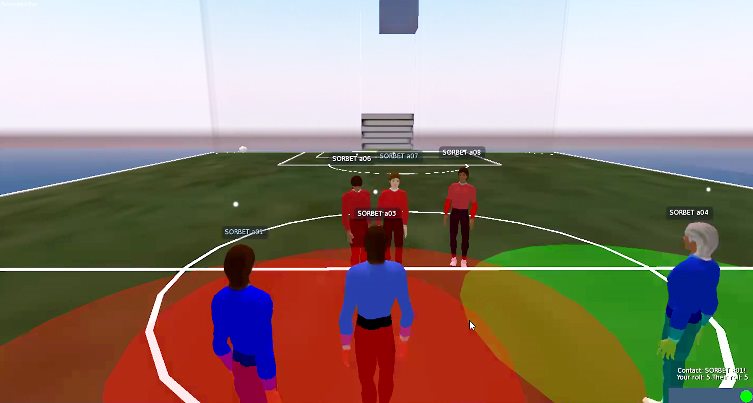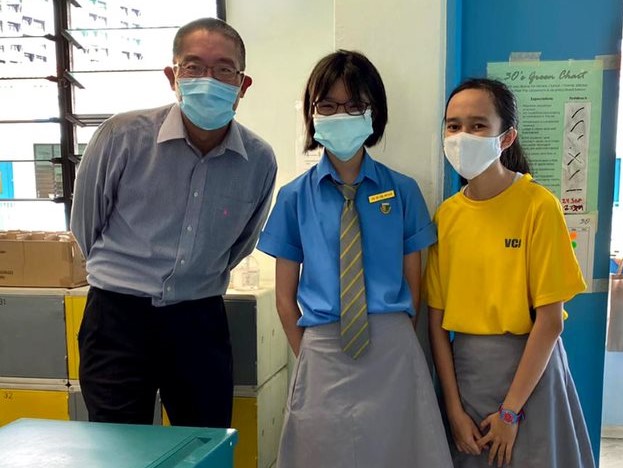Young Children’s Voices in Mathematical Problem Solving
Contributed by Dr Ho Siew Yin and Sng Wei Qin Abbie, from NTUC First Campus, for SingTeach Virtual […]
Read More
With the COVID-19 pandemic, safe distancing measures have been put in place worldwide. In order to impress upon students the importance of safe distancing, Dr Kenneth Lim, Research Scientist at the Office of Education Research, NIE, developed the Socially Responsible Behaviour through Embodied Thinking (SORBET) Project.
The project makes use of a virtual environment based on opensource technologies to create an immersive experience to help students understand the concepts involved in the spread of a virus from the perspective of Citizenship and Character Education, and of Mathematics. The spread of the virtual virus is based on probability – each interaction in the virtual environment is logged and charted – thus students are able to see the direct correlation between their actions and the consequences incurred, without any time lag. Representing the SORBET Project team, Kenneth shares more with us.

Why do you believe that the SORBET Project is effective in helping students understand the importance of social distancing?
I believe that the SORBET Project is effective because the students themselves are telling us this. My team and I surveyed 114 Secondary Two students, and it was heartening to see a statistically significant positive difference in their responses to the statement “I can make a difference to how Singapore responds to the COVID-19 pandemic” after they had gone through the project simulation. This idea of taking personal responsibility for our actions lies at the heart of the SORBET Project, because we really would like students to exercise self-discipline in forming the habit of practising social distancing because they truly believe in its importance, and not simply because they are told by others to do so.
What are your hopes for the SORBET Project?
My team and I are excited to take the SORBET Project further in 2021. We have recently applied for funding to enable the project to be compatible with a wider range of platforms, such as tablets and smartphones. Additionally, thus far we have only engaged with secondary school students, so we also are planning to engage with primary schools regarding the project. Stay tuned!
Representing the SORBET Project team: Dr Kenneth Lim
Research Scientist, Office of Education Research, National Institute of Education, Nanyang Technological University
Students from Bedok South Secondary School had the opportunity to experience the SORBET Project simulation. Jaden and Sundong share with us their experience and what they have learnt from it.

Jaden: I had a very good experience with the SORBET Project. It was a fun game that I really enjoyed. One of the interesting aspects of the game is that I was able to interact with my friends in the game and the interactions would be recorded. This interaction log would be used in the transmission of the virus, which is another unique part of the game. Overall, I think the game was really interesting and unique because being able to interact with your friends is a very uncommon thing in educational games.
Sundong: Overall, I found the experience enjoyable. At first, when we were tasked to find figures with different shapes and colors, I found it suspicious since we were told that it was a math workshop, but finding the figures required little to no math skills. After they announced the actual aim a few days later, I understood why they called it a math workshop! The project taught me that social distancing reduces the chance of unknowingly infecting or being infected by others. The advantage of the SORBET Project is that it teaches through demonstrations instead of explanations. To me, demonstration is a more effective way to teach since I understood social distancing better through the experience.
Sundong and Jaden
Bedok South Secondary School
In Cedar Girls’ Secondary School, two students, Aurelia Azifa Chelfannisa and Natalie Lee, used the SORBET Project to conduct a social experiment on their classmates to observe people’s behaviour towards social distancing, and the impact of their actions on their health and those around them. The participants of the experiment were first asked to go through the SORBET Project simulation without having been informed about the presence of a virus in the virtual environment. Next, the participants were told that there was a virus in the simulation and asked to repeat the simulation, and the girls administering the experiment observed the corresponding changes in their behaviour.

What have you learnt from the SORBET Project and the social experiment you conducted with your classmates?
Aurelia: This project has been an exciting experience for me. We were introduced to the SORBET Project to aid us in our research project. We conducted activities in the virtual space with groups of participants who would get “infected” if they got too close to one another, just like in real life. This SORBET environment has been a suitable replacement of a real life setting and has allowed us to see how people would behave in their daily lives. By observing their interactions, we were able to have a better understanding of how people in society would also behave in the community. Those who are more reckless with social distancing measures ended up getting infected in the simulation and I was able to draw links to their behavior in real life too. Overall, the SORBET Project has given me a platform to better understand and be more observant of people’s behavior.
Natalie: There were many learning opportunities which came with the SORBET Project. Since we had no experience in conducting social experiments, we had no idea what to expect. In fact, the first run of our activity failed. However, as the saying goes: “Failure is the key to success”. So, we learnt from the failure and moved on. Looking into the data we collected from the second round of the social experiment, we were able to analyse social behavior among our classmates and the reasoning behind such behaviors.
How do you think the SORBET Project can benefit you and your classmates?
Aurelia: The SORBET Project was an interesting and new software that I have never used before and has been a fun experience for me. It was a suitable software to act as an environment to simulate real life and for participants to play around with. We were also able to manipulate some of the settings of the SORBET environment to suit our activities. This allowed us to observe the participants’ behaviors and how they reacted to different situations. It is a very flexible and comfortable software to use. This project has also taught us how to observe our surroundings at a larger scale too. It has made me realize that these different behaviors can also be seen around us in real life. I hope that my classmates and the other participants were able to do so too, to be more wary of the people around them and their actions. I look forward to using this software again in the future for other projects.
Natalie: The SORBET Project provides a visualization of how diseases can spread within a community, depending on different variables. This allows for players to have a deeper understanding on the importance of safe distancing. As our classmates could explore and interact with the simulation environment personally, they were able to observe how their own actions directly affected the results – the number of infected individuals. This hands-on experience also encourages players to apply information they have obtained from real life situations to the simulation and vice versa. As for me and my teammate, the project allowed us to think like researchers and gain some insight into the world of qualitative research.
Aurelia Azifa Chelfannisa and Natalie Lee
Cedar Girls’ Secondary School
Subscribe to our newsletter to receive the latest information about our articles and events. Email us at sgteach@nie.edu.sg for assistance.
On topics related to teaching and learning, we invite you to contribute articles that focus on the following:
We welcome contributions that explore how educators are shaping the future of learning in a rapidly changing world marked by technological advancements and global challenges.
If you have a classroom or education research story to share, we invite you to send in your contribution articles.
Submit your contribution here:
SingTeach complies with the Personal Data Protection Act 2012 of Singapore
For questions, please contact the editorial team: sgteach@nie.edu.sg
